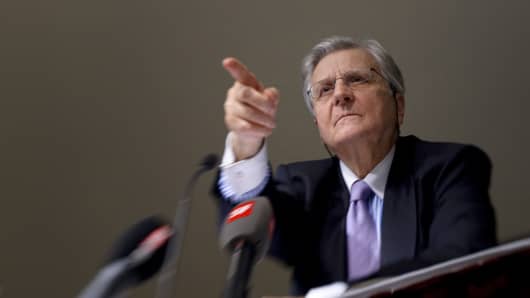As German chancellor Angela Merkel prepares to take her austerity message to the G20 in Toronto this weekend, the head of the European Central Bank Jean-Claude Trichet has held her up as an example to the rest of the euro zone.
Merkel’s actions will boost confidence among households, investors and companies and will help consolidate the recovery, Trichet said in an interview with Italy's La Repubblica.
That view is at odds with what George Soros said Wednesday, when the legendary investor told an audience in Berlin that the euro is a flawed construct.
"By insisting on pro-cyclical policies, Germany is endangering the European Union," Soros warned. "I realize that this is a grave accusation, but I am afraid it is justified."
Trichet dismissed this, saying the euro was a very credible currency that has kept its value from its debut and has guaranteed price stability for 11 and a half years, with an annual average inflation of 1.98 percent in the euro-zone in that period.
"A currency that guarantees such stable prices, it's of value in the eyes of domestic and international investors" Trichet told the Italian paper.
The single European currency fell against the dollar since worries over certain euro zone countries' ability to pay their debt begun.
On Wednesday, Soros said that "by cutting its budget deficit and resisting a rise in wages to compensate for the decline in the purchasing power of the euro, Germany is actually making it more difficult for the other countries to regain competitiveness."
Merkel defended her actions over the weekend, saying they will prevend future crises.
Deflation Risks
But Trichet does not believe that austerity measures being put in place by European governments will cause deflation.
Some of the more bearish investors are betting that cuts in government spending across the European Union will add to deflationary pressures at a time when consumers and businesses are de-leveraging.
Growth will fall sharply, with private sector deflation pushing yields on 10-year bonds down to 2 percent, triggering a new wave of quantitative easing, Bob Janjuah, chief markets strategist at RBS told CNBC earlier this month.
"I don't think that such risks could materialize," said Trichet, adding that inflation expectations were well anchored. "As regards the economy, the idea that austerity measures could trigger stagnation is incorrect."
Reforming the real economy in each country in the euro zone is what is needed, according to Trichet.
"We ask all governments to be determined to carry out structural reforms to increase the potential growth," he said. "I insist on the need to boost work productivity: in the medium- and long-term, growth depends right on this."



